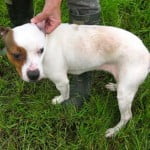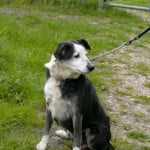Pet Advice Guides for Pet Owners
Dogs with allergies
If your dog is always scratching and his skin is red and inflamed, the cause of the trouble might be that he’s suffering from an allergy. First rule out parasitic infections and your vet is the one to advise on this. If your dog is free from mites and fleas and mange and it’s still scratch, scratch, scratch, what is going on? An allergy is an over-reaction to the body’s immune system. The allergic reaction is causing excessive inflammation with redness, soreness, itchiness and swelling. We know from our own experience that this is very unpleasant and it will be for your dog too. There are four different types of allergic skin disease: food allergy, contact dermatitis, atopic dermatitis or atopy and urticaria:
Food allergy – is caused by something in the diet that the dog’s system cannot cope with – a skin flare up is the consequence . The dog has to eat what we give him, maybe his body cannot cope with an overlode of manufactured food and derivatives.
Contact dermatitis is a reaction to something in the environment such as cleaning products – a lot of these are harsh and unnatural, they cause allergic reactions in humans and just think how much closer our pets are to these strong smelling sanitizers and chemical air fresheners.
Atopy is perhaps the most common skin complaint and is caused by your pet coming in contact with substances in the air – pollen, house and dust mites for example.
Urticaria is a sudden onset flare up when there are swellings and wheals on the skin – it can be caused by a reaction to drugs, bites and stings – see the vet who will prescribe anti-inflammatory medication which usually gives prompt relief. We’ll look at individual allergies in future articles, at present we’ll consider holistic action – getting your dog into peak health and condition which will help alleviate disease. Always consult your vet if you are worried about any aspect of your dog’s health.
You can go to endless lengths in trying to identify the exact substance that is causing the problem. It’s an exclusion zone and trial and error. Simple common sense methods are worth a try and getting rid of all toxic, manufactured and chemical substances is step one. Your dog may be telling you that he wants to live in a natural home. Vinegar is a good cleanser, also orange and lemon oil. The National Trust Book of cleaning methods will keep you on the right track – there’s nothing in there to provoke an allergic reaction in either man or beast. The methods are cheaper and they work. You don’t have to buy things that have been made in a factory and packed in plastic before being transported many miles to a supermarket! So a natural environment is good for your dog’s skin. Washing the pet bed in certain brands of stain removal soap powder has been know to give a dog itchy skin. Steam clean or wash in water only and hang out for the wind, sun and moon to freshen. A few herbs, such as lavender, tea tree or mint will make the bed smell nice.
It’s easy to forget that dogs are wearing fur coats and so need less heat than us – plenty of fresh air is the key to health. No, we don’t want him to sit out in a cold yard, but exercise and running about is good and unless you have very fine coated and nesh pets, the dog bed shouldn’t be in an over-heated sitting room. We’ve recently had a golden oldie dog come in to the sanctuary and he’s in tip top condition with a shiny, glossy coat even though he’s 14 years old. Yes, you’ve guessed it, he’s lived outside in a kennel all of his life and he’s had a diet of very plain food and plenty of bones. You should see his gleaming white teeth.
The condition of the coat reflects the general health of every animal. If it’s thin, scurvy and itchy – what does it tell us? The health is not good. Supple, soft and gleaming with health is what we like to see. We give our dogs Dorwest Herb supplements and these have a proven beneficial effect on the skin. We’ve been using them for over 40 years and we see the results every day. (You can buy Dorwest Herbs in our online shop or call in to our visitor centre ‘In the Dog House’.) We find that Garlic and Fenugreek tablets deal with minor skin infections and Mixed Vegetable tablets ease the irritation. These should be continued for at least a month to see results. When dogs are prone to itchy skin, we feed them all the time. Herbal medicines have proved to be particularly effective in controlling these conditions by dealing holistically with the problem. EasiGreen should be added to the diet of all animals suffering from skin allergies. Kelp Seaweed tablets encourage good coat growth and Evening Primrose Oil helps keep the skin supple and encourages coat growth. You can put Comfrey and Calendula Balm on to the sore patches and it will soothe dry, scaly skin during treatments.
Even when the skin is healthy again it’s best to keep going with the routine. Wheatgerm Oil is a vitamin supplement which helps to maintain the skin in good health. Some dogs are particularly prone to irritation around their feet and Garlic Juice which you can use to clean the pads and paws is an excellent remedy. It’s safe to use even when the skin is dry and scaly. Organic Comfrey and Calendula Skin Balm will help heal any sore patches and skin abrasions. All these tablets, balms, medicines and supplements are made by Dorwest Herbs and are guaranteed veterinary medicines – in stock ‘In the Dog House’ at the sanctuary or our online shop.
We give a cleansing diet to any sick animal and we find it especially valuable when used in conjunction with herbal treatments. If your dog is off his food, has a fever or you are worried, always consult the vet. A natural, fresh raw food diet is simple and easy to prepare. It’s inexpensive and has no preservatives, flavourings or unnatural colourings – no animal derivatives (could be almost anything!) either. Our experience, over 60 years, is that if a good, fresh basic diet is followed, less health problems occur and a healthy resistance to infection and disease is maintained. The dog is a carnivore and we believe that a diet based on natural principles and as close to nature as possible is the best one for your dog. (more on feeding coming next)
The manufacture of pet food is a massive industry in the U.K. today. It was practically unknown forty years ago. It is a business with the prime motivation of profitability. The advertising hype is awesome. Feeding dogs used to be so easy – cheap meat from the butcher, toasted wholegrain bread, a few left over veg, a spash of home made gravy. Fish scraps occasionally. A new laid egg when eggs were cheap or the hens were laying. Big bones! yum yum. We only used to see the vet if the dog was injured. Now feeding a pet relies on factories, cans, packaging, labelling, storage, miles of transportation, storage again, supermarket shelves, advertising, promotion, contests and give aways. We don’t know exactly what the pre-shaped, mushed up, including animal derivatives (?) ingredients are.
Advertising dog food is of relatively recent origin and yet the campaigns have been so successful that a considerable proportion of pet lovers believe that their dog will become ill and even die if he doesn’t have his canned or de-hydrated packet rations!!! The power of advertising. It’s true I’m afraid. The queues at the vets are longer. Do more dogs suffer allergies? Back to nature people please.



